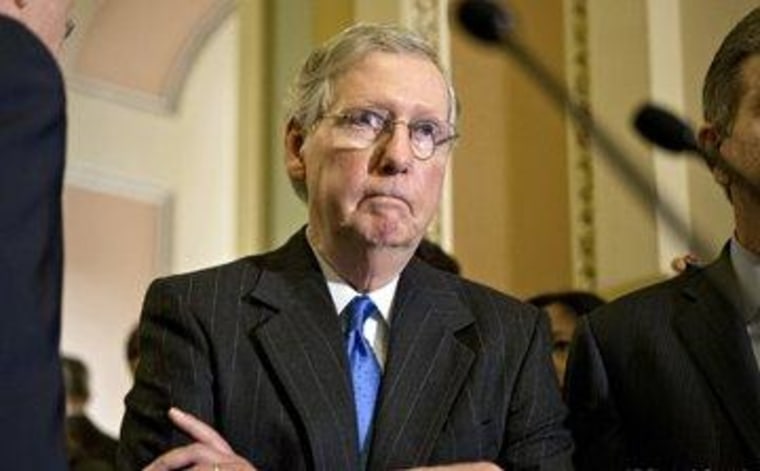When senators got together this week to strike a deal on filibusters, the nuclear option, and confirmation votes, there was one senator who was noticeably absent from the negotiating table: Senate Minority Leader Mitch McConnell (R-Ky.). Ordinarily, since the Kentucky Republican leads the GOP caucus, McConnell would be helping lead the talks, but this week, that role fell to Sen. John McCain (R-Ariz.).
By last night, the Minority Leader went so far as to chide his party's negotiators -- a move that was not well received.
A meeting of Senate Republicans on Wednesday grew tense as Senate Minority Leader Mitch McConnell, R-Ky., told his members he could have gotten a better deal on nominations than the one negotiated by rank-and-file Republicans.McConnell's tone, according to multiple sources, implied that he had been kept in the dark about the talks between some in his own ranks and Democrats. However, those same Republicans say they kept McConnell updated throughout their negotiating process.Sen. Bob Corker, R-Tenn., got so frustrated with McConnell's presentation of events, that he called "bulls**t" loud enough for the room to hear, nearly a half-dozen sources said.
As a rule, when senators are shouting "bullpucky" -- or perhaps a related word with a similar prefix -- at their own party's leader, it's not a good sign.
But taking a step back, there are two larger points. The first is that there seems to be a contingent within the Senate GOP -- a group that clearly includes McCain, at least for now -- that's not altogether satisfied with McConnell's style. This contingent appears to be getting impatient over the Senate's breakdowns and dysfunction, and this week, they were even willing to go around him and negotiate with Democratic leaders directly.
That's really not a good sign for McConnell. When rank-and-file members decide their leader isn't getting the job done so they circumvent him to strike their own deal, it suggests McConnell's control is slipping badly. Indeed, the Louisville Courier-Journal published a hard-hitting editorial this morning, noting that some of McConnell's "more rational Republican colleagues in the U.S. Senate pushed him aside," leaving the leader "sidelined." The piece added, "It is a stunning fall from power for Mr. McConnell, famous for marching his members in lock-step party discipline, and could leave him considerably weakened as he seeks a sixth Senate term, touting his power and influence."
McConnell's re-election platform is largely based on touting his leadership role on the Hill. The claim is looking increasingly shaky.
The second larger point to keep in mind is that the Republican Party's fissures are getting increasingly difficult to ignore. The House GOP caucus is split in a variety of ways, and Mitch McConnell's control over his Senate caucus is crumbling.
Meanwhile, some ugly Republican primary fights are likely to take shape in the coming months, and Rand Paul is battling Liz Cheney in a proxy fight over neo-conservatism.
It's against this backdrop that the GOP is looking at polls showing an unpopular party pushing an unpopular agenda.
After the Republicans' electoral setbacks in 2012, party leaders immediately got to work on a "rebranding" effort that was discarded within a couple of months. That time probably would have been better spent elsewhere -- such as agreeing on a policy agenda and addressing these fissures that are coming to the fore.
